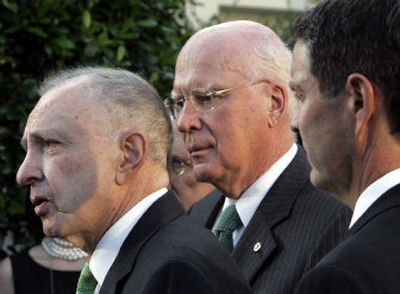Democrats splitting over Roberts

WASHINGTON – Chief Justice-nominee John Roberts, his confirmation secure, picked up support from fractured Senate Democrats on Wednesday as President Bush met lawmakers to discuss a second vacancy on the Supreme Court.
The Senate Judiciary Committee’s senior Democrat, Patrick Leahy of Vermont, announced his endorsement shortly after leaving the White House. That guaranteed bipartisan backing for Roberts in today’s scheduled vote by the committee.
But Senate Democratic leader Harry Reid, liberal stalwarts Barbara Boxer of California and Edward Kennedy of Massachusetts, former presidential candidate John Kerry of Massachusetts and New Jersey Sens. Jon Corzine and Frank Lautenberg all are opposing Roberts. Their stand is evidence of the split among the Senate’s 44 Democrats about whether they can or should mount even symbolic opposition to the successor to late Chief Justice William H. Rehnquist.
Because Republicans control the Senate and the committee, majority support was assured for the vote and for confirmation next week in the full Senate.
Some of the Democrats’ liberal supporters hoped a strong vote against Roberts would signal to Bush that if he were to replace retiring Justice Sandra Day O’Connor with a far-right conservative, it would lead to a bigger fight in the Senate.
Leahy, who has led filibuster fights against Bush’s lower court nominees, said in a Senate speech, “I do not intend to lend my support to an effort by this president to move the Supreme Court and the law radically to the right.”
But Roberts “is a man of integrity,” said Leahy. “I can only take him at his word that he does not have an ideological agenda.”
Other Democrats, including Sens. Tim Johnson of South Dakota and Max Baucus of Montana, also have announced their support. Sens. Ben Nelson of Nebraska and Mary Landrieu of Louisiana are leaning toward voting for Roberts.
Leahy’s decision was “inexplicable and deeply disappointing,” said Ralph Neas, head of People for the American Way.
The stakes become greater with the next nominee, and “the next nomination is going to be a great deal more contentious,” said Sen. Arlen Specter, R-Pa., the Judiciary Committee’s chairman.
The conservative Roberts would replace Rehnquist, a reliably conservative vote on the court. Bush’s next nominee will replace O’Connor, one of the court’s swing voters on affirmative action, abortion, campaign finance, discrimination and death penalty cases. Replacing her could give the president a chance to swing the court to the right on many issues.
Specter cautioned Bush during the Wednesday morning meeting that nominating either Priscilla Owen or Janice Rogers Brown – two appeals court judges Democrats filibustered but eventually allowed to be confirmed – to the O’Connor seat could cause problems, according to a congressional official familiar with the meeting.